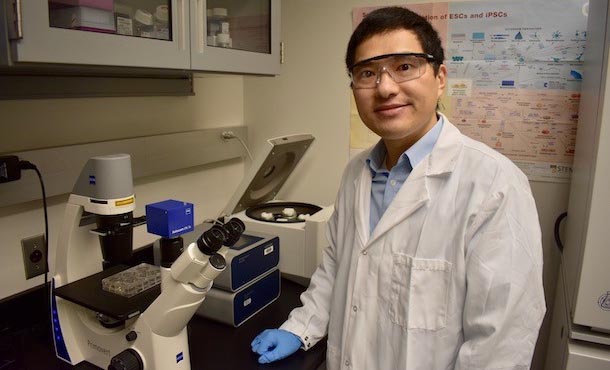
Xiaojun “Lance” Lian. IMAGE: JAMIE OBERDICK/PENN STATE
Penn State researcher receives a Rising Star Award in biomedical engineering
12/20/2019
By Jamie Oberdick
UNIVERSITY PARK, Pa. — Xiaojun “Lance” Lian, assistant professor of biomedical engineering at Penn State, has been named one of the 2020 Rising Star Award recipients in stem cell engineering by the Biomedical Engineering Society’s (BMES) Cellular and Molecular Bioengineering Special Interest Group (CMBE SIG).
The CMBE SIG presents the honor to select junior principal investigators who have demonstrated exceptional work in their young career. Lian will receive the award and give a podium presentation at the 2020 CMBE SIG Conference to be held Jan. 2-6 in Puerto Rico.
Lian was honored with the award for his research on differentiating stem cells into pancreatic beta cells to be used for therapies to treat type 1 diabetes. The pancreas produces enzymes that help digest food, along with hormones that play an important role in maintaining sugar and salt in the human body. One of these hormones, insulin, is necessary for regulating blood glucose. Beta cells, which are found in the pancreas, synthesize and secret insulin.
Type 1 diabetes interrupts this process and destroys the beta cells. Without beta cells to keep blood glucose concentrations in an acceptable range, symptoms such as dizziness, confusion, seizures and loss of consciousness can occur. Insulin injections are the current standard way for patients to adjust their blood glucose.
“For example, if a diabetic person drinks a sugary soft drink or eats food, their blood glucose concentration increases,” Lian said. “Then they need insulin to adjust the glucose so then they have to inject insulin into themselves.”
Lian said his research into beta cell therapy for diabetes is based on offering patients an alternative to insulin injections that can cause multiple issues for patients. The injection requires constant blood glucose monitoring because an insulin injection causes a sharp decrease in glucose concentration. Sharp fluctuations in glucose concentration can lead to serious side effects for the patient.
“If you have a big fluctuation in glucose concentration, that can cause health complications and other diseases, including even stroke or heart attack,” Lian said.
With pancreatic beta cell therapy, which involves transplanting the differentiated beta cells into the patient, the fluctuations in glucose are small and part of the body’s natural process. Therefore, the beta cell therapy does not have the potentially serious side effects of insulin injections.
While this would be good news for diabetes patients, the challenge researchers face in creating functional beta cells at a scale necessary for medical treatments is a lack of robust cell culture systems. To overcome this hurdle, Lian and his research team discovered a new way for stem cells to differentiate into pancreatic lineages by using small molecules that are organic compounds with low molecular weight. The small molecules induce differentiation by activating or inhibiting key cell signaling pathways, an important step in changing stem cells into other cells.
This discovery led to Lian receiving a Penn State College of Engineering Engineering for Innovation & Entrepreneurship grant in 2019 to create kits that would use his small-molecule method to differentiate beta cells. This would enable more efficient and economical beta cell production.
“These kits would enable easier beta cell differentiation and potentially have broad commercial appeal,” Lian said.
The Rising Star Award is the latest of multiple awards Lian has won in recent years. These include the BMES Junior Investigator Award of Advanced Biomanufacturing in 2017 and 2018, the BMES Young Innovator Award in 2016, and the Cozzarelli Prize of the National Academy of Science in 2013 for the best biomedical science paper in the Proceedings of the National Academy of Sciences. He also has been awarded seven United States patents.

